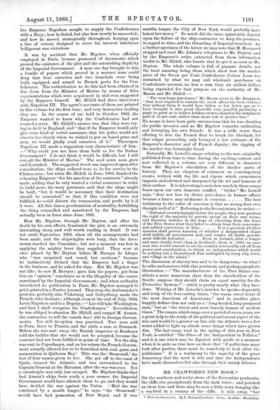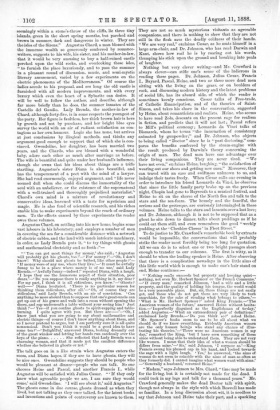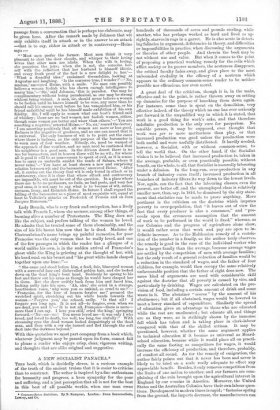MR. CRAWFORD'S NEW BOOK.* ON the southern and rocky shore
of the Sorrentine peninsula, the cliffs rise precipitously from the dark water ; and perched on them here and there may be seen a little town hanging like a sea-bird in a cranny of the cliffs. A mile away, "but
• With the Immortals. By F. Marlon Crawford. 2 vols. Lnidon Macmillan.
seemingly within a stone's-throw of the cliffs, lie three tiny islands, green in the short spring months, but parched and brown in summer, dark and dangerous in winter. They are the isles of the Sirens." Augustus Chard, a man blessed with the immense wealth so generously conferred by romance- writers, suggests to his wife, his sister, and his mother-in-law, that it would be very amusing to buy a half-ruined castle perched upon the wild rocks, and overlooking these isles, " to furnish the place luxuriously, and to pass the summer in a pleasant round of discussion, music, and semi-mystic literary amusement, varied by a few experiments on the electric phenomena of the Mediterranean." Of course the ladies accede to his proposal, and ere long the old castle is furnished with all modern improvements, and with every luxury which even the heart of a Sybarite can desire. It will be well to follow the author, and describe, although far more briefly than he does, the summer inmates of the Castello del Gaudio. Lady Brenda, the mother-in-law of Chard, although forty-five, is in some respects the youngest of the party. Her figure is faultless, her thick brown hair is hers by growth and not by purchase, and her bright blue eyes survey the world with an air of radiant satisfaction as con- tagious as her own humour. Logic she has none, but arrives at just conclusions by illogical methods, and thinks any argument good enough to support that of which she is con- vinced. Gwendoline, her daughter, has been married two years, and the Chards, who are blessed with a wonderful baby, adore each other as much after marriage as before. The wife is beautiful and quite under her husband's influence, though she owns that his ideas about things are a trifle startling. Augustus's sister Diana is also beautiful, and has the temperament of a poet with the mind of a lawyer. She had read enormously, enjoyed argument, and " life never seemed dull when she could discuss the immortality of the soul with an unbeliever, or the existence of the supernatural with a well-trained and thoroughly prejudiced materialist." Chard's own mind is a mixture of revolutionary and conservative ideas, leavened with a taste for mysticism and magic. He is also fond of scientific research, and his riches enable him to make experiments beyond the reach of ordinary men. To the effects caused by these experiments the reader owes these volumes.
Augustus Chard, on settling into his new home, begins some vast labours in his laboratory, and employs a number of men in covering the sea for a considerable distance with a network of electric cables, and the land with much intricate machinery, in order, as Lady Brenda puts it, "to try things with ghosts and mathematical electricity and so forth
" You can get moat things for money,' she said ; Augustus will probably get his ghosts, too !'—' For money ?'—` Oh, I don't know ! Why should not ghosts be bribed, like other people ?'- If money were of any use, where they live.'—' It must be awfully funny to be in a place where money is of no use,' said Lady Brenda. = Awfully funny—indeed !' repeated Diana, with a laugh. `I hope they see the humorous aspect of their situation, poor dears.'—' Do you suppose there is really anything in it, my dear ? For my part, I think it is all ridiculous, you know.' = Ghosts ? well—' Diana hesitated. There is no particular reason for
thinking them ridiculous, after Oh, of course they are ridiculous,' said Lady Brenda, with an air of conviction. Can anything be more absurd than to suppose that one's great-uncle can get up out of his grave and walk into a room without opening the doors, and rap underneath a table without your seeing him ? Just think l'—` Yes—if you confine ghosts to spirit-rapping and table- turning. I quite agree with you. But there are—'—' Oh, I know just what you are going to say about mathematics and electric things—of course I don't know anything about them, and so I never pretend to argue, but I am perfectly sure it is all quite nonsensical. Don't you think it would be a good idea to have some tea ?'—' Delightful,' answered Diana, looking dreamily out of the great window and letting her hands run carelessly over the keys of the piano She reflected that Lady Brenda was a charming woman, and that it made not the smallest difference whether she believed in ghosts or not."
The talk goes on in a like strain when Augustus enters the room, and Diana hopes, if they are to have ghosts, they will be nice ones. Gwendoline suggests they should be people who• would be pleasant at dinner—people who can talk. So one chooses Heine and Pascal, and another Francis I., while Augustus will be satisfied with Julius Omar. " If they only knew what agreeable people we are, I am sure they would come,' said Gwendoline. I will see about it,' said Augustus." The ghosts come in due course, ghosts dressed as when they lived, but not talking as they once talked, for the latest books and inventions and points of controversy are known to them.
They are not so much mysterious visitants as agreeable companions, and there is nothing to show that they are not
still in the flesh save the deadly coldness of their hands. "We are very real," exclaims Caesar, as he seats himself in a large arm-chair, and Dr. Johnson, who has read Darwin and Kant, shows how real he is by roaring out his words, thumping his stick upon the ground and breaking into peals of laughter. Nothing but very clever writing—and Mr. Crawford is always clever—can stifle one's sense of the ludicrous in reading these pages. Dr., Johnson, Julius Ceesar, Francis I., Bayard, Pascal, Heine, and two or three more dead men sitting with the living on the grass, or on boulders of rock, and discussing modern history and the latest problems of social life, has its absurd side, of which the reader is sometimes keenly conscious. Caesar talks of Free-trade, of Catholic Emancipation, and of the theories of Saint- Simon, and takes his share in the conversation, suggested by Heine, about romanticists and realists. Heine, who seems to have read Zola, descants on the present rage for realism in fiction, and predicts that it will not last ; Pascal refers to Mill's political economy ; Leonardo da Vinci talks of Bismarck, whom he terms " the incarnation of consistency animated by gunpowder ;" and Dr. Johnson, who objects to being called " Doctor" since he is " past doctoring," com- pares the benefits conferred by the steam-engine with the result produced by Darwin's theory concerning the origin of man The dead men have one advantage over their living companions. They are never tired. " We have not even," exclaims Heine, laughing, " the satisfaction of wearing out our shoes and getting new ones." Moreover, they can travel with an ease and swiftness unknown to us, and indulge their tastes freely. When Cm3ar calls one evening in order to introduce his friend Leonardo da Vinci, he observes that since the little family party broke up on the previous night, Chopin had gone to Bayreuth to a musical festival, and Heine to sit on the shores of the North Sea and talk to the stars and the sea-foam. The homely and the fanciful, the serious and the grotesque, are curiously intermingled in these volumes. Heine talks to the stars and laments over a lost love;
and Dr. Johnson, although it is not to be supposed that as a ghost he sits down to dinner, talks about puddings as if he could eat them still, and even remembers the good " weekly
pudding at the ' Cheshire Cheese' in Fleet Street."
To do justice to Mr. Crawford's remarkable book by extracts would be impossible, the conversations that will probably strike the reader most forcibly being too long for quotation. All we can do is to select one or two bright passages short enough to transfer to our columns. The first is witty, as it should be when the leading speaker is Heine. After observing that there is a complication nowadays in the little aims of this little world which is enough to make one's hair stand on end, Heine continues :-
" Nothing really succeeds but property and keeping quiet— nothing, not even Mr. Herbert Spencer or the French Commune.' = If every man,' remarked Johnson, had a wife and a little property, and the quality of holding his tongue, the world would be a very peaceable place. But, sir, these things are not easily got, and those who do not get them are very likely to turn anarchists, for the sake of stealing what belongs to others.'— 'What is Mr. Herbert Spencer ?' asked King Francis.= The American woman of the future,' answered Heine without hesita- tion.' Imperfectly disguised as the Englishman of to-day,' added Augustus.= What an extraordinary pair of definitions I' exclaimed Lady Brenda.—` Do you think so P' asked Heine.
Mr. Spencer's books seem to me to be all about what we should do if we knew everything. Evidently American women are the only human beings who stand any chance of illus- trating his theories.'—' There were no American women in my day,' remarked the King, but I have seen something of them since without being able to understand them. They are not very like women. I mean that their idea of what a woman should be differs from mine.'—' Sir,' said Johnson, I suppose so.'—King Francis swung his plumed cap in his hand, and looked towards the sage with a light laugh. Yes,' he answered, the aims of woman do not seem to coincide with the aims of man so often as they formerly did. I cannot imagine what women want with aims.' = Generally a husband,' returned Heine."
" Madam," says Johnson to Mrs. Chard, " time may be made for the living, but it is certainly not made for the dead. I could tuck in my legs and talk for a thousand years." Mr.
Crawford generally makes the dead Doctor talk with spirit,
though not always in the style with which Boswell has made us familiar. In a long discussion about wit, it is needless to say that Johnson and Heine take their part, and a sparkling passage from a conversation that is perhaps too elaborate, may be given here. After the remark made by Johnson that wit only exhibits itself in attack or in the answer to an attack —that is to say, either in attack or in controversy—Heine says :-
" 'Most men prefer the former. Most men think it very pleasant to shut the door closely, and whisper to their loving wives that other men are idiots. When the wife is loving, she perceives the joke; when she is not, she consoles her- self with the reflection that her husband is himself idiotic, and every fresh proof of the fact is a new delight to her,'— `What a dreadful idea !' exclaimed Gwendoline, looking at Augustus and laughing. 'Is the converse true, I wonder ?'—' No, madam,' answered Heine, with a smile. No man can possibly believe a woman foolish who has shown enough intelligence to marry him.'—' Sir,' said Johnson, 'this is paradox. One may be complimentary without being paradoxical, as one may be strong without being violent. A man, sir, should never believe a woman to be foolish until he knows himself to be wise, any more than he should call his enemy weak before he has vanquished him, or his friend unfaithful until he has himself made exhibition of his own fidelity. Sir, I will apply to women what our host's friend said of whiskey ; there are no bad women, nor foolish women, either, though some women are better and wiser than others.'—` You are asserting a negative,' retorted Heine.—` No, sir,' roared the doctor; ' I am asserting positively that all women are more or less good. Badness is the negative of goodness, and no one can assert that it is universal. The only business of wit is to point out the cases where there is badness, as the only purpose of the barometer is to warn men of foul weather. Nobody, sir, need be warned of the approach of fine weather, and no man need be cautioned that his neighbour is a good man. In the African desert there is no use for barometers, and in heaven there will be no wit; for where all is good it will be as unnecessary to speak of evil, as it is sense- less to carry an umbrella amidst the sands of Sahara, where it never rains.'—' You have at least shown a new and surprising relation between wit and the barometer,' answered Heine. After all, it carries out the theory that wit is only found in attack or in controversy; since it is clear that where attack and controversy are impossible, wit must be out of the question. In a place where there are to he no professors, no fools, no bad poets, and very few good ones, it is not easy to say what is to become of wit, satire, sarcasm, irony, and Heinrich Heine. In future I shall regard the falling of the barometer as a piece of most exquisite wit, equal at least to Voltaire's attacks on Frederick of Prussia and on Jean Jacques Rousseau.'" Lady Brenda, who is very frank and outspoken, has a lively talk with Francis I., whom she accuses, among other things, of burning alive a number of Protestants. The King does not like the subject, and prefers talking of the women he loved. He admits that he treated some of them abominably, and the sins of his life haunt him now that he is dead. Madame de Chateaubriand's name brings up painful memories, for poor Franeoise was the only woman that he really loved, and one of the few passages in which the reader has a glimpse of a world unlike his own, is in the sudden arrival of Francoise's ghost while the King is grieving at the thought of her, with
his head on his breast and "his great white hands clasped together upon one knee :"—
" She came and stood before him, a frail, fair, blue-eyed woman with a sorrowful face and dishevelled golden hair, and she looked down on the dead king's bent head. Suddenly he sprang to his feet and threw out his arms as though he would have clasped her in them. But she drew swiftly back from him and faced him, looking sadly into his eyes. Ah, sire,' she cried in a strange, heartbroken voice, why were you so unkind, so cruel to me ?'— Francoise, for the love of heaven forgive me !' groaned the wretched spirit, stretching out his white hands towards the woman.—' Forgive you,' she echoed, sadly. Is that all ? I forgave you long ago. It is not all—to forgive, even when we are dead, you and L'—' It is not all, Francoise—there is more— more than I can say. I love you still,' cried the king,' springing forward.—`No—no—no ! You never loved me—it was only I who loved, and loved to death, too well, to long, too sinfully !' With streaming eyes the dead woman looked despairingly at the *dead man, and then with a cry she turned and fled through the soft dusk into the darkness beyond."
With this quotation we must part company from a book which, whatever judgment may be passed upon its form, cannot fail to please a reader who enjoys crisp, clear, vigorous writing, and thoughts that are alike original and suggestive.




































 Previous page
Previous page